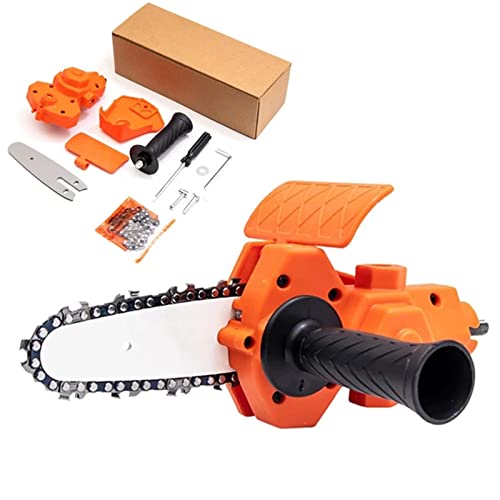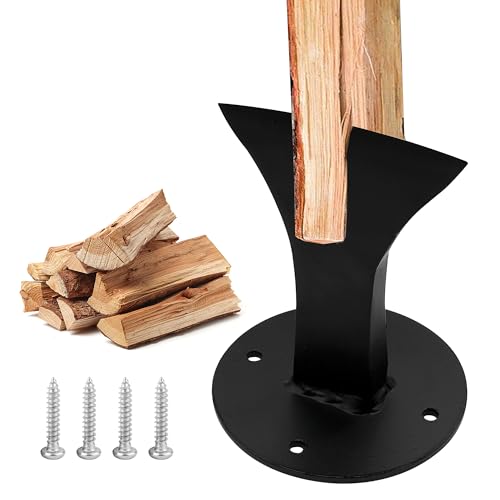I have a birch tree that is about 5 years old. Every year has been fine until this year. Late spring the leaves started to get brown dots on them and within about a month the leaves started to fall. The tree was bare by July. Do you know what the disease (?) is? Here is a picture of it: http://cfneumann.us/graphics/birch.jpg
You are using an out of date browser. It may not display this or other websites correctly.
You should upgrade or use an alternative browser.
You should upgrade or use an alternative browser.
birch disease?
- Thread starter CFNeumann
- Start date

Help Support Arborist Forum:
This site may earn a commission from merchant affiliate
links, including eBay, Amazon, and others.
ChrisWNY
ArboristSite Operative
Can you provide photos of the trunk? Do a Google search for Bronze Birch borer, chlorosis, etc. It could be a number of things. Only reason I suspect chlorosis is that those leaves look real pale/yellow in your photos. Is there an adequate supply of mulch around the birch tree? Birches are water loving trees but also require fertile soil that drains well. You can contact your County extension office and have an expert inspect your tree, or consult an arborist in your area.
ddhlakebound
Addicted to ArboristSite
This one appears to be planted too deep, and depending on how buried the root flare is, it could be the main stress factor for this young birch.
Gently remove the mulch and dirt at the base of the trunk until you get down to the first structural roots. If you have to prune a few small roots in the process, thats ok. Once you get down to the correct level, add the mulch back, but make the circle bigger, and keep it away from the base of the trunk.
Gently remove the mulch and dirt at the base of the trunk until you get down to the first structural roots. If you have to prune a few small roots in the process, thats ok. Once you get down to the correct level, add the mulch back, but make the circle bigger, and keep it away from the base of the trunk.
ChrisWNY
ArboristSite Operative
Perfect example of why it's important to post photos of the trunk. 
No root flare visible, and far too little mulch. ddhlake - can a tree be saved when it's gotten to this point? I didn't realize that was possible.
No root flare visible, and far too little mulch. ddhlake - can a tree be saved when it's gotten to this point? I didn't realize that was possible.

$59.99 ($0.40 / Foot)
$69.79 ($0.47 / Foot)
Arborist Rigging Rope 1/2 in x 150 Ft Blue Bull Rope Polyester Braided Arborist Rope 1/2 inch 48 Strands 150 Feet for Various Outdoor Applications Construction Climbing Swing Sailing
Glfcai store

$56.99 ($0.38 / Foot)
$69.99 ($0.47 / Foot)
Arborist Rigging Rope Bull Rope Black (1/2 in x 150ft) Polyester Braided Arborist Rope 48 Strands for Tree Work Camping or Swinging…
UIERTIO

$26.99 ($0.22 / Foot)
$29.99 ($0.25 / Foot)
VEVOR Double Braided Polyester Rope, 1/2 in x 120 ft, 48 Strands, 8000 LBS Breaking Strength Outdoor Rope, Arborist Rigging Rope for Rock Hiking Camping Swing Rappelling Rescue, Orange/Black
Amazon.com

$202.29
Oregon Yukon Chainsaw Safety Protective Bib & Braces Trousers - Type A Protection, Dark Grey, Large
Express Shipping ⭐⭐⭐⭐⭐

$215.05
$233.19
Weaver Leather WLC 315 Saddle with 1" Heavy Duty Coated Webbing Leg Straps, Medium, Brown/Red
Amazon.com

$204.65
Oregon 295453/S Yukon+ Type A Class 1 (20 m/s) Chainsaw Protective Trousers, Black, 3X-Large
Express Shipping ⭐⭐⭐⭐⭐

$337.83
$369.99
WEN Electric Log Splitter, 6.5-Ton Capacity with Portable Stand (56208)
Amazon.com

$79.99
ZELARMAN Chainsaw Chaps 8-layer Protective Apron Wrap Adjustable Chainsaw Pants/Chap for Loggers Forest Workers Class A
QUALITY GARDEN & HAND TOOLS

$63.99
ZELARMAN Chainsaw Chaps Apron Wrap 8-layer for Men/Women Loggers Forest Workers Protective Chain Saw Pants Adjustable
QUALITY GARDEN & HAND TOOLS
ddhlakebound
Addicted to ArboristSite
Nice work. That looks much better now. I'm still a bit concerned....I can see the structural roots, but the trunk seems to get narrower at the very bottom, where it should be tapering out wider. Is that just an illusion from the pic?
Did you find any roots growing in a circular pattern, or anything constricting the trunk as you dug?
Be sure to give back it's mulch ring, and you'll hopefully see a marked improvement next spring and growing season. I know it seems just too simple, but having the root flare exposed really is that important.
Chris:
Trees are very adaptable, and overcome many obstacles, especially young ones. If you've still got life in the cambium, the tree can rebound and thrive with a bit of help to correct the problems.
Did you find any roots growing in a circular pattern, or anything constricting the trunk as you dug?
Be sure to give back it's mulch ring, and you'll hopefully see a marked improvement next spring and growing season. I know it seems just too simple, but having the root flare exposed really is that important.
Chris:
Trees are very adaptable, and overcome many obstacles, especially young ones. If you've still got life in the cambium, the tree can rebound and thrive with a bit of help to correct the problems.
ChrisWNY
ArboristSite Operative
Have your soil tested - that's the first step, a soil test will indicate whether or not your soil is deficient in a particular mineral or element. The three basic elements necessary for plant growth are: Nitrogen (N), Phosphorus (P), and Potassium (K), and are the elements found in compounds within various fertilizer mixtures. The best and safest fertilizers for trees are organic - corn gluten, mulch (wood chips), or compost. Mulch is preferred because it reduces soil compaction, helps retain moisture, and stabilizes the soil temperature during weather extremes, hot and cold spells. The wider your mulch ring, the less competition from weeds and other plants, so your tree can establish its roots more effectively. Mulch should be avoided against the trunk since it can lead to trunk rot and result in disease, mulch at least 4-5" away from the trunk.
Root flare should look like this:
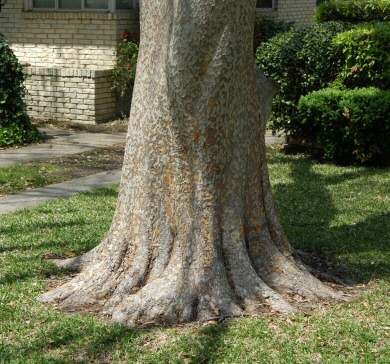
If your tree is planted too deeply, this is what can happen:
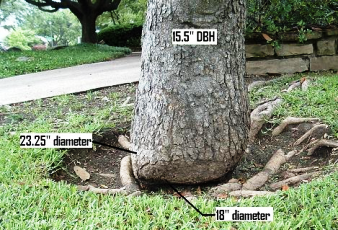
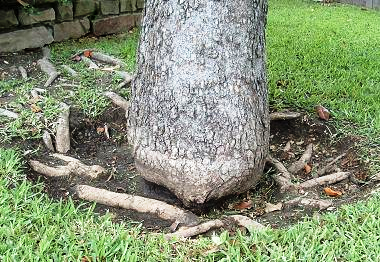
Poorly-planted trees have trunks that look like flag poles going into the ground, if there is no trunk taper at the bottom, there will be growth issues in the future. It is sometimes correctable by exposing the root flare, then cutting away any "adventurous" roots in the Fall - this was the advice I was given with one of my Red Maples that was planted too deeply in the container it was purchased, and unfortunately I didn't clear the soil off the top of the root flare before planting. It's a hassle to dig down and expose the root flare, but will be great for your tree(s) in the long run.
Root flare should look like this:

If your tree is planted too deeply, this is what can happen:


Poorly-planted trees have trunks that look like flag poles going into the ground, if there is no trunk taper at the bottom, there will be growth issues in the future. It is sometimes correctable by exposing the root flare, then cutting away any "adventurous" roots in the Fall - this was the advice I was given with one of my Red Maples that was planted too deeply in the container it was purchased, and unfortunately I didn't clear the soil off the top of the root flare before planting. It's a hassle to dig down and expose the root flare, but will be great for your tree(s) in the long run.
"Mulch should be avoided against the trunk since it can lead to trunk rot and result in disease, mulch at least 4-5" away from the trunk."
So the base of the tree will be similar to the collar (cone shaped) a dog or cat has to wear after surgery when you apply the mulch.
So the base of the tree will be similar to the collar (cone shaped) a dog or cat has to wear after surgery when you apply the mulch.
Similar threads
- Replies
- 29
- Views
- 2K
- Replies
- 1
- Views
- 197
- Replies
- 21
- Views
- 1K




















